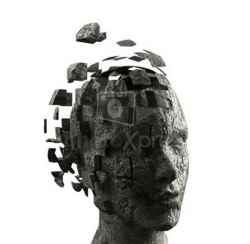Soul
The soul, in many mythological, religious, philosophical, and psychological traditions, is the incorporeal and, in many conceptions, immortal essence of a person, living thing, or object. According to some religions (including the Abrahamic religions in most of their forms), souls—or at least immortal souls capable of union with the divine belong only to human beings. For example, the Catholic theologian Thomas Aquinas attributed "soul" (anima) to all organisms but taught that only human souls are immortal. Other religions (most notably Jainism) teach that all biological organisms have souls, and others further still that non-biological entities (such as rivers and mountains) possess souls. This latter belief is called animism. Anima mundi and the Dharmic Ātman are concepts of a "world soul."
Soul can function as a synonym for spirit, mind, psyche or self.
Buddhism teaches that all things are in a constant state of flux: all is changing, and no permanent state exists by itself. This applies to human beings as much as to anything else in the cosmos. Thus, a human being has no permanent self. According to this doctrine of anatta (Pāli; Sanskrit: anātman) – "no-self" or "no soul" – the words "I" or "me" do not refer to any fixed thing. They are simply convenient terms that allow us to refer to an ever-changing entity.
The anatta doctrine is not a kind of materialism. Buddhism does not deny the existence of "immaterial" entities, and it (at least traditionally) distinguishes bodily states from mental states. Thus, the conventional translation of anatta as "no-soul" can be confusing. If the word "soul" simply refers to an incorporeal component in living things that can continue after death, then Buddhism does not deny the existence of the soul. Instead, Buddhism denies the existence of a permanent entity that remains constant behind the changing corporeal and incorporeal components of a living being. Just as the body changes from moment to moment, so thoughts come and go. And there is no permanent, underlying mind that experiences these thoughts, as in Cartesianism; rather, conscious mental states simply arise and perish with no "thinker" behind them. When the body dies, the incorporeal mental processes continue and are reborn in a new body. Because the mental processes are constantly changing, the being that is reborn is neither entirely different than, nor exactly the same as, the being that died. However, the new being is continuous with the being that died – in the same way that the "you" of this moment is continuous with the "you" of a moment before, despite the fact that you are constantly changing.
Buddhist teaching holds that a notion of a permanent, abiding self is a delusion that is one of the causes of human conflict on the emotional, social, and political levels. They add that an understanding of anatta provides an accurate description of the human condition, and that this understanding allows us to pacify our mundane desires.
Various schools of Buddhism have differing ideas about what continues after death. The Yogacara school in Mahayana Buddhism said there are Store consciousness which continue to exist after death. In some schools, particularly Tibetan Buddhism, the view is that there are three minds: very subtle mind, which does not disintegrate in death; subtle mind, which disintegrates in death and which is "dreaming mind" or "unconscious mind"; and gross mind, which does not exist when one is sleeping. Therefore, gross mind less permanent than subtle mind, which does not exist in death. Very subtle mind, however, does continue, and when it "catches on", or coincides with phenomena, again, a new subtle mind emerges, with its own personality/assumptions/habits, and that entity experiences karma in the current continuum.
Plants were said to be non-sentient (無情), but Buddhist monks should avoid cutting or burning trees, because some sentient beings rely on them. Some Mahayana monks said non-sentient beings such as plants and stones have buddha-nature. Some buddhists said about plants or divisible consciousnesses .
Certain modern Buddhists, particularly in Western countries, reject—or at least take an agnostic stance toward—the concept of rebirth or reincarnation, which they view as incompatible with the concept of anatta. Stephen Batchelor discusses this issue in his book, Buddhism Without Beliefs. Others point to research that has been conducted at the University of Virginia as proof that some people are reborn.

